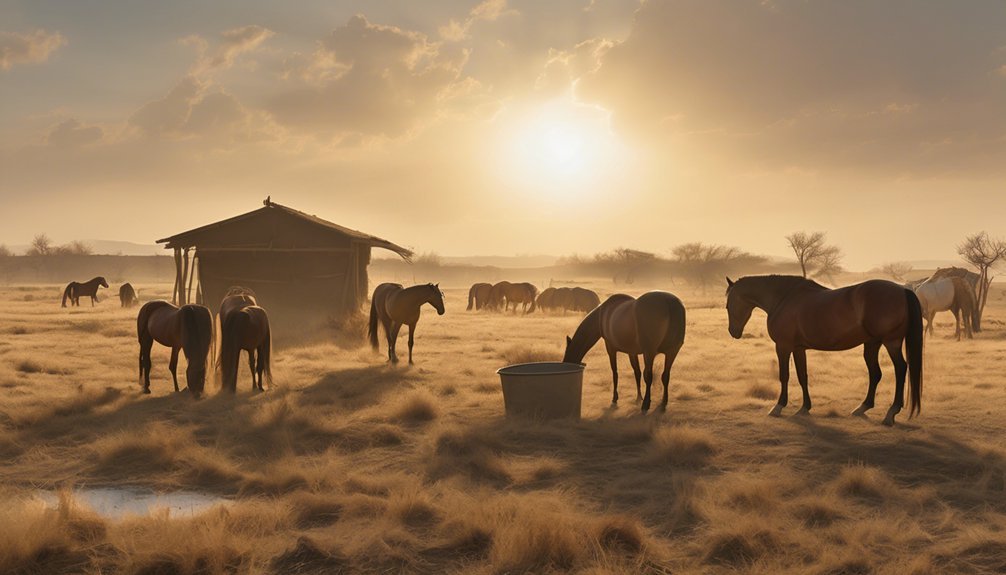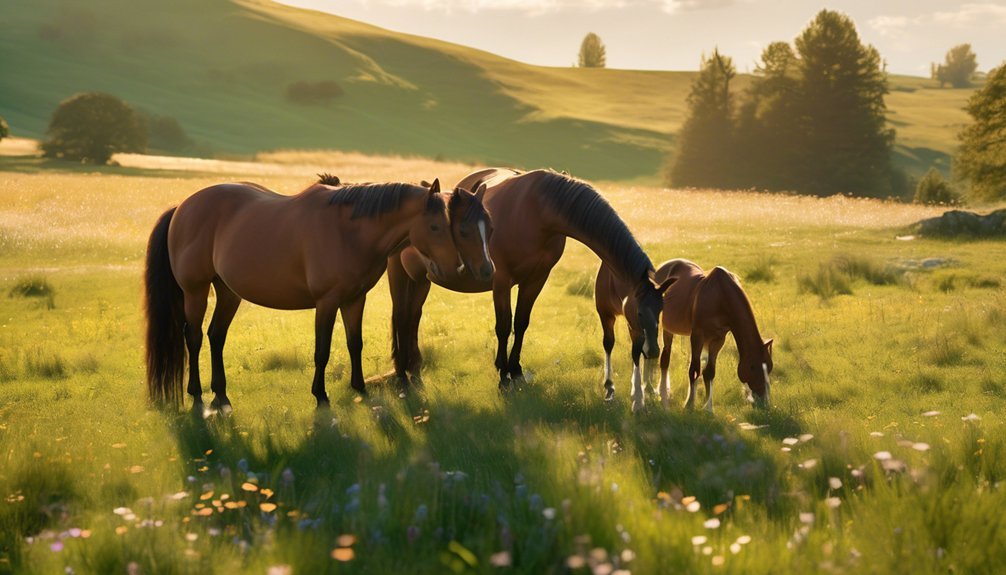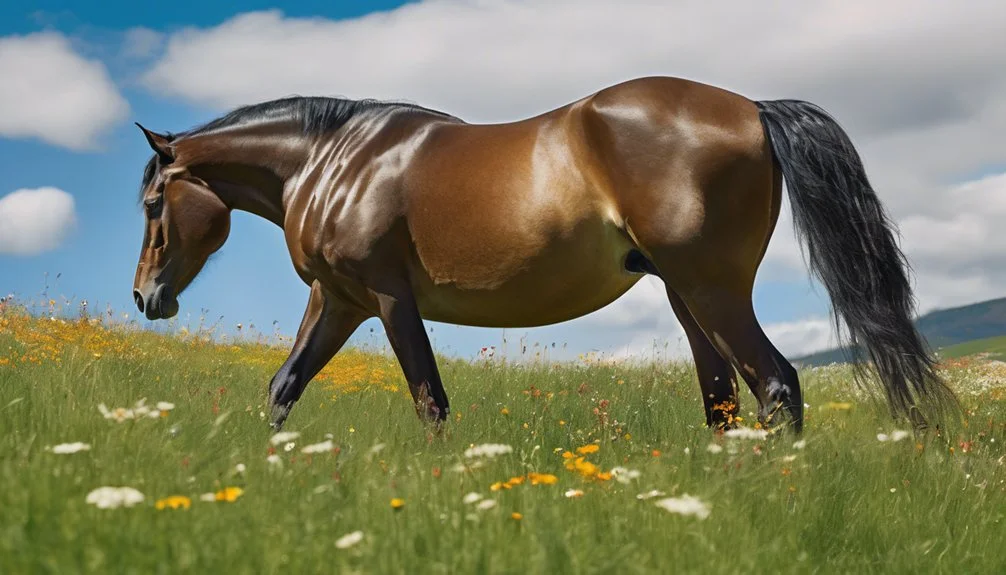
Forage is fundamental to your horse's diet, providing essential fiber for digestive health and overall well-being. It supports gut function, encourages natural chewing, and promotes salivation, all crucial for effective digestion. Understanding the types of forage available and their nutritional components can help you meet your horse's needs. But how do you determine the right amount of forage and balance it with other feeds? Let's explore these key considerations further.
Key Takeaways
- Forage is essential for maintaining digestive health and preventing issues like colic and laminitis in horses.
- It provides necessary fiber, promoting gut function and nutrient absorption.
- High-quality forage supports healthy microbial populations and encourages natural chewing behaviors.
- Horses should consume 1.5% to 2% of their body weight in forage daily for optimal health.
- Balancing forage with other feed types ensures a complete diet, catering to individual energy and nutritional needs.
Importance of Forage in Equine Nutrition
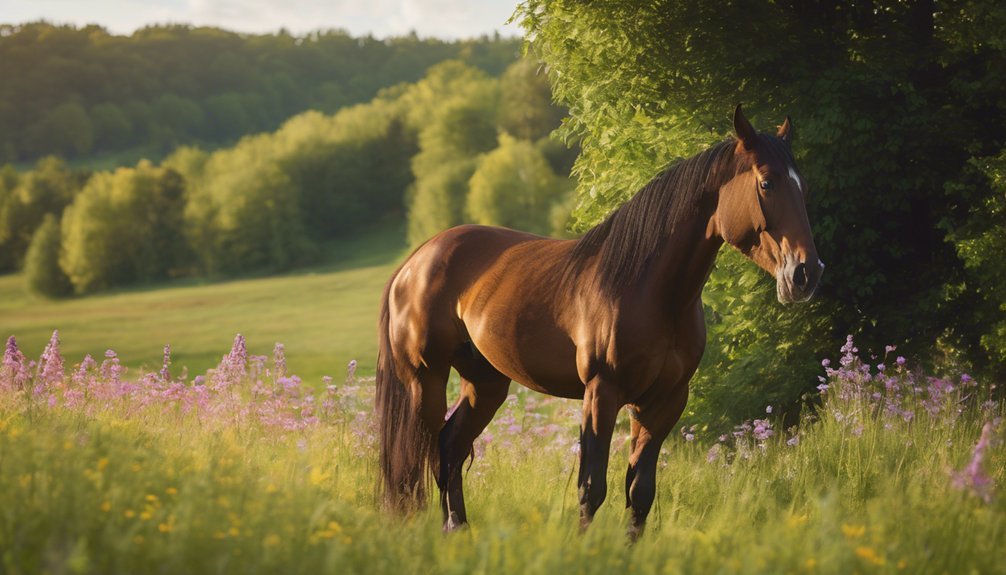
Forage is crucial in your horse's diet, not just as a source of fiber but also for overall digestive health.
The quality of forage you provide directly impacts your horse's gut function and nutrient absorption. High-quality forage supports healthy microbial populations in the digestive tract, which are essential for breaking down nutrients.
When your horse consumes adequate forage, it promotes salivation and encourages natural chewing behaviors, enhancing digestion.
Poor forage quality, on the other hand, can lead to digestive disturbances like colic or laminitis.
By prioritizing high-quality forage, you help maintain a balanced diet, ensuring your horse thrives.
Types of Forage for Horses
Choosing the right type of forage is essential for maintaining your horse's health and performance. There are various hay varieties and pasture types to consider, each with unique benefits.
For instance, grass hay, like timothy or orchard grass, provides excellent fiber without excessive calories, making it ideal for maintaining a healthy weight. Legume hays, such as alfalfa, are rich in protein and energy, perfect for growing or working horses.
Pasture types also play a significant role; mixed grass pastures offer a balanced diet, while specialized pastures can provide essential nutrients. Understanding these options allows you to tailor your horse's forage intake, ensuring they receive the right balance for their needs.
Always consult with a nutritionist to optimize their diet effectively.
Nutritional Components of Forage
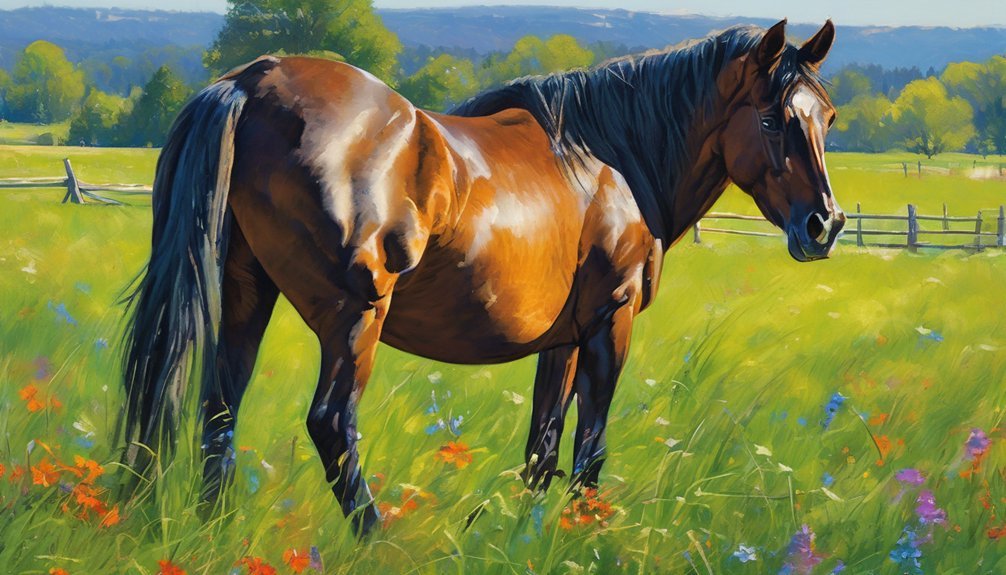
Understanding the nutritional components of forage is crucial for optimizing your horse's diet. Forage primarily provides essential fiber content, which aids digestion and promotes gut health. High fiber levels keep your horse feeling full and satisfied, reducing the likelihood of digestive issues.
Additionally, the mineral availability in forage plays a significant role in your horse's overall health. Minerals like calcium, phosphorus, and magnesium are vital for bone strength, muscle function, and metabolic processes.
How Much Forage Does Your Horse Need?
Determining the right amount of forage for your horse is essential for maintaining its health and performance. Generally, horses should consume about 1.5% to 2% of their body weight in forage daily.
However, it's not just about quantity; forage quality also plays a crucial role.
Consider these factors when assessing your horse's forage needs:
- Body weight: Heavier horses may require more forage for proper digestion and energy.
- Activity level: More active horses often need increased forage to support their energy demands.
- Forage type: Different types of hay and pasture offer varying nutrient profiles, affecting overall forage quality.
Balancing Forage With Other Feed Types

While forage forms the foundation of a horse's diet, balancing it with other feed types is crucial for optimal health and performance.
You'll want to ensure that the forage quality is high, as this impacts the overall nutritional intake. By incorporating grains, concentrates, or supplements, you can address specific needs your horse may have, such as energy or protein.
However, feed moderation is key; too much of anything can lead to digestive issues or imbalances. Monitor your horse's condition closely, adjusting the proportions of forage and other feeds as necessary.
This tailored approach helps maintain a healthy weight, supports energy levels, and ensures your horse thrives, combining the benefits of diverse feed options while respecting the core role of forage.
Tips for Selecting and Storing Forage
When selecting forage for your horse, consider factors like quality, type, and storage conditions to ensure optimal nutrition. Proper forage selection is crucial for your horse's well-being.
Look for fresh, green hay free of mold, dust, or weeds. Additionally, choose the right type based on your horse's specific dietary needs.
When it comes to forage storage, keep these tips in mind:
- Store in a dry, well-ventilated area to prevent mold growth.
- Use airtight containers for smaller quantities to maintain freshness.
- Regularly inspect your forage for signs of spoilage or pests.
Frequently Asked Questions
Can Horses Eat Hay That Is Moldy or Dusty?
You shouldn't feed your horse moldy hay or dusty forage. Both can cause respiratory issues and digestive problems. Always ensure your horse's feed is clean and free from contaminants to maintain their health and well-being.
How Can I Tell if My Forage Is Fresh?
To determine if your forage is fresh, check for vibrant color, pleasant smell, and absence of mold. Proper forage storage prevents spoilage, ensuring high forage quality. Moldy or dusty hay isn't worth the risk for your horse.
Are There Any Forage Alternatives for Horses With Allergies?
If your horse has allergies, you might wonder about forage alternatives. Options like Timothy hay, orchard grass, or even beet pulp can aid in allergy management, providing essential nutrients without triggering reactions. Explore these choices carefully!
Can I Mix Different Types of Forage for My Horse?
Yes, you can mix different forage types for your horse. Combining forages can enhance nutritional variety, but ensure you gradually introduce changes to avoid digestive upset. Monitor your horse's response to the new mix for best results.
What Signs Indicate That My Horse Is Not Getting Enough Forage?
If your horse's energy dips like a wilting flower, it may lack essential forage benefits. Watch for weight loss, changes in behavior, and poor coat condition—all signs it's time to reevaluate forage types in the diet.
Conclusion
In the grand tapestry of equine nutrition, forage is the golden thread that weaves health and vitality into your horse's life. By understanding its crucial role, you'll ensure your horse thrives like a well-tended garden, flourishing with every bite. Balancing quality forage with other feed types is key, much like a symphony needing harmony. So, choose wisely and store properly, and you'll cultivate a strong foundation for your horse's well-being, allowing them to gallop into a vibrant future.



